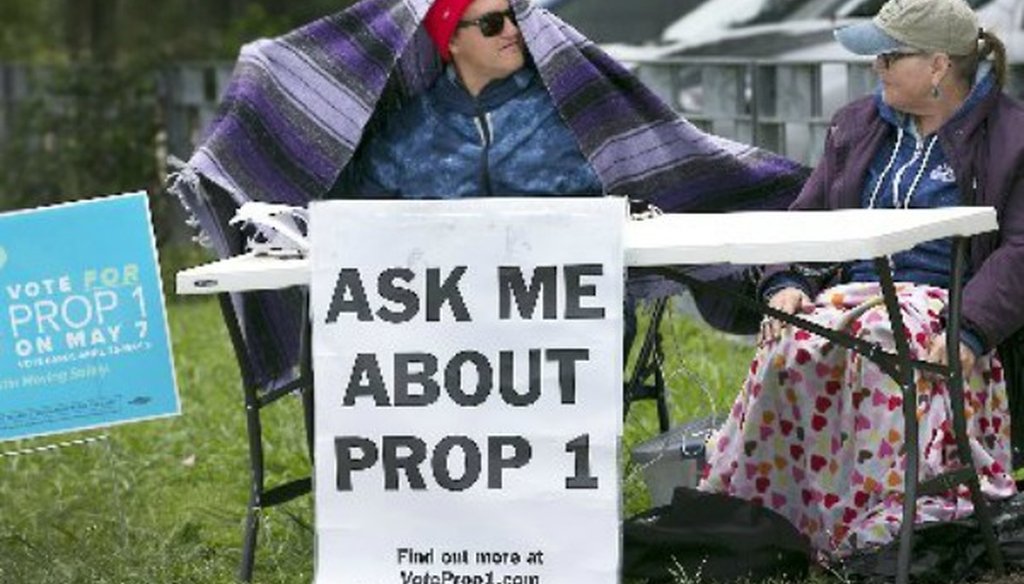Stand up for the facts!
Our only agenda is to publish the truth so you can be an informed participant in democracy.
We need your help.
I would like to contribute

On a chilly day, proponents of Proposition 1 on Austin's May 7, 2016, ballot await voters (Austin American-Statesman, Ralph Barrera).
The proposition before Austin voters on Saturday’s ballot mostly has to do with whether local drivers for ride-hailing services like Uber and Lyft should undergo national criminal background checks that start from a person’s name (agree, vote "for") or fingerprints (agree, vote "against").
End of story? Not if you’ve got a mailbox or a TV set.
Ad campaigns, mostly carried out by the Uber/Lyft-funded pro-proposition group, Ridesharing Works for Austin, have pummeled voters with claims.
We’ve tackled the accuracy of a few as has Ben Wear, the Austin American-Statesman’s transportation writer.
So...
Sign up for PolitiFact texts
--Did DWI crashes decrease 23 percent after ride-hailing services came to Austin?
You can get to that conclusion by comparing crashes over certain time periods. But change timeframes and you get other results--even that such accidents increased. Keep in mind, too, this reduction reflects a correlation between when Uber came to Austin and DWI-connected accidents--not necessarily causation. We rated this Uber claim MOSTLY TRUE.
--Has an Austin women’s center seen sexual assault survivors that report being attacked by their ride-hail drivers at a rate of one per month? Stop Abuse for Everyone told us that count reflected what forensic nurses heard over the last half of 2015. However, SAFE’s CEO told us its nurses heard no such reports through the first three-plus months of 2016, perhaps a welcome indication the pattern wasn’t persisting. We rated this claim, aired in April by a group in opposition to the ballot proposal, HALF TRUE.
--Do statistics show "you are about nine times more likely to be assaulted by a taxi driver" in Austin than a driver for a ride-hailing service? Not so, we found, mainly because detailed data about types and lengths of ride-hail and taxi trips haven’t been made public or number-crunched. Drawing on statistics experts, we rated this claim by a proposition backer, Austin City Council Member Ellen Troxclair, PANTS ON FIRE.
--If voters spurn the proposition, will a new city-run criminal background check process cost millions in processing fees, additional staff, and bureaucracy with taxpayers getting the bill? Ridesharing Works for Austin, which makes this claim in a voter mailer, didn’t have factual backup, we found, nor did city officials confirm as much. It's up in the air who’s going to pay for each background check reviewed by the city. Yet we found no authoritative cost estimate for the city’s oversight. Additional staff might be needed, for instance, but the relevant department advises it can lean on existing staff. Significantly, taxpayers aren't poised to get the bill; city costs are to be covered from a fee-backed fund, not tax revenue. We found this claim FALSE.
Want more? Read Wear’s commentaries here. His news stories are stacked here. Separately, the League of Women Voters of the Austin Area Education Fund has posted its "Voters Guide" describing Proposition 1 here.
Our Sources
Truth-O-Meter articles, PolitiFact Texas, "Uber says drunk-driving crashes down in Austin since advent of ride-sharing services," Dec. 16, 2015; "'Our City' backers give incomplete account of reported sexual assaults by Austin ride-hailed drivers,", April 15, 2016; "Ellen Troxclair lacks facts for claim about chances of sex assault by an Austin taxi driver," April 15, 2016; "Facts missing behind claim that fingerprint checks of Austin drivers will cost city millions," April 30, 2016
Commentaries and news stories by Ben Wear, Transportation writer, Austin American-Statesman
"Voters Guide," Travis and Williamson counties, League of Women Voters of the Austin Area Education Fund, April 2016







































